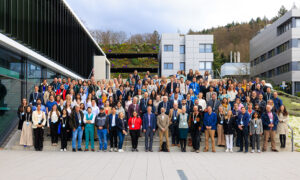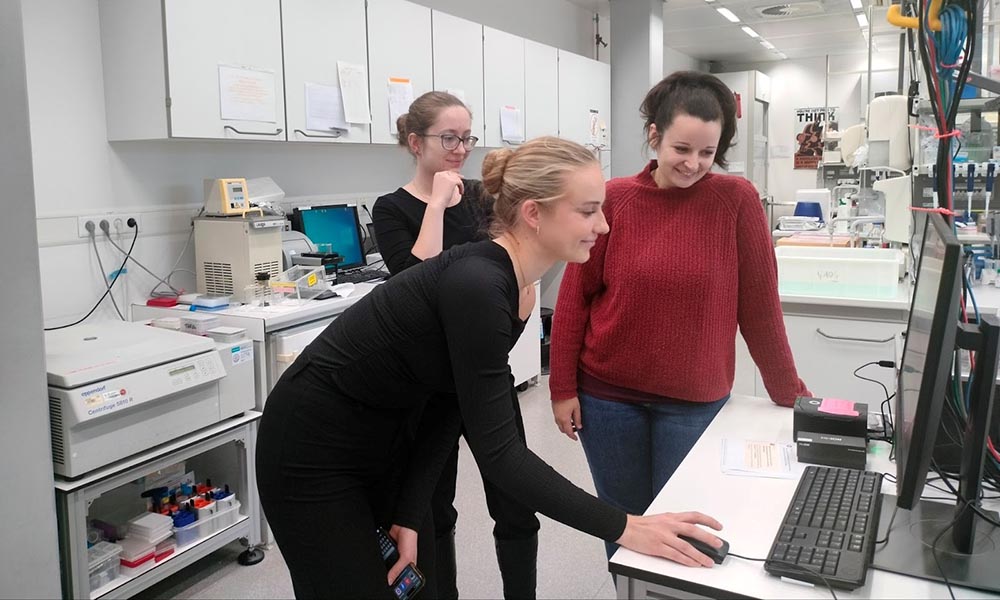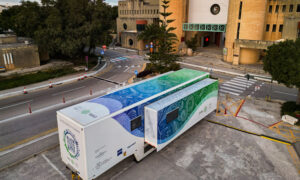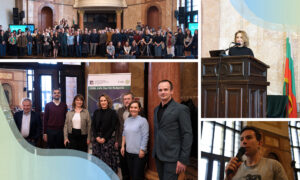
Sharing scientific expertise to empower European partners
EMBL and its partners have received funding from the European Commission for two new Twinning Projects, which will build expertise and research capacity in its member states

One of EMBL’s core missions is to integrate life-science research in Europe and globally. This involves not only providing excellent training and services to European researchers but also advancing the European life-science ecosystem as a whole to strengthen the quality and impact of research emerging from the region. One way EMBL does this is through Twinning Projects that pair two or more countries to strengthen networking and exchange of scientific expertise within the European Research Area.
In 2024, EMBL received funding from the European Commission’s Horizon Europe programme for two such projects, enabling it to establish new links with institutes in Slovakia and Portugal, respectively. The Twinning Projects pair a research institution in a ‘widening’ country – one that would benefit from growth in expertise and resources – with two or more leading research institutions in Europe in a position to share expertise and build capacity.
EMBL has previously been a partner in five such Twinning Projects, funded under the Horizon 2020 programme. The new projects will help it continue its tradition of knowledge-sharing and scientific cooperation with member states.
BIOMICS: enabling biomedical research in Portugal
Lying at the intersection of human health and applied life sciences, biomedical research plays a crucial role in a nation’s progress, leading to better diagnostics and treatment strategies for infectious and non-infectious diseases. BIOMICS, the first of the two new Twinning projects, aims to build biomedical research expertise by advancing biomedical data science capacities at one of Portugal’s leading institutes – Instituto de Medicina Molecular João Lobo Antunes (iMM).
“Through collaborative projects with partner institutions, training the next generation of Portuguese scientists in state-of-the-art in biomedical data analysis, and bolstering iMM’s entrepreneurial and innovation capabilities in biomedical data science, BIOMICS will establish iMM as a leader in biomedical research and promote Portugal as a competitive force in global scientific innovation,” said Evangelia Petsalaki, EMBL-EBI Group Leader and the primary EMBL project coordinator.
In addition to EMBL, BIOMICS also relies on the expertise of researchers at the Swiss Federal Institute of Technology, Switzerland, and the Centre for Genomic Regulation in Spain. Together, the partner institutions plan to implement joint research projects with iMM, leveraging the latter’s cutting-edge research in cell and molecular biology, immunology, parasitology, microbiology, and oncology. The project also aims to help attract talented researchers to iMM and enhance their training in scientific skills, critical thinking, data interpretation, and research ethics. In addition, through targeted workshops and training, the project will strengthen iMM’s technology transfer and innovation capacity, further aiding the translation of biomedical research.
“EMBL-EBI’s expertise in bioinformatics, data infrastructure, and training makes it an ideal partner for BIOMICS, as it aligns with the project’s goals to strengthen iMM’s biomedical data science capabilities,” Petsalaki said. “By leveraging EMBL-EBI’s resources and international network, BIOMICS can enhance collaboration, training, and data analysis at iMM, advancing Portuguese scientific competitiveness.”
This is the third Twinning project involving Portuguese participation in the past five years, reflecting EMBL’s commitment to building research capacity in Portugal. OLISSIPO focused on key applications of statistics in molecular biology research, for example, in single-cell analyses and simulations, and the mathematical modelling of cell–cell interactions to enhance computational biology capabilities. SymbNET expanded collaborative research and training capacities in microbiota research to promote the formation of a European network of excellence in this field.
FORGENOM II: empowering genomics research in Slovakia
Following the completion of the Human Genome Project, the field of genomics has seen rapid advancement in the past couple of decades, with many large-scale sequencing initiatives currently in progress that rely on international cooperation and cutting-edge genomics technologies. Genomics can offer us the tools and opportunities to better understand our ecosystems, improve human health, and answer elusive questions about fundamental biology of living organisms.

The Twinning project FORGENOM II aims to build expertise in advanced genomic techniques at Comenius University, Bratislava, ultimately helping Slovakia enter pan-European genomic projects and increasing its visibility. GeneCore, EMBL’s genomics core facility at the forefront of the genome sequencing revolution since being established almost a quarter-century ago, is one of the key partners in this initiative, along with Italy’s Università degli Studi di Milano Bicocca (UNIMIB).
“EMBL’s and GeneCore’s profound experience and reputation in applications of genomic methods are well-known, and we frequently provide advanced practical training in them,” said Vladimir Benes, Head of GeneCore. “As it is one of EMBL’s roles to work together with its member states, it is simply delivering on this role.”
As part of the project, three scientists from Comenius University recently visited the GeneCore facility at EMBL. This follows multiple exchanges between scientists at EMBL and Comenius University following the project kickoff in May 2024 and a successful course delivered by GeneCore Staff in Bratislava in July 2024. Terézia Ďuranová, Diana Rusňáková, and Zuzana Hanzlíková are part of a research team working on a variety of biomedical questions, including the development of screening tools in oncology through liquid biopsy samples, as well as identifying genomic biomarkers relevant for other pathologies, including neurological diseases such as Alzheimer’s and epilepsy. Last but not least, they are investigating human-bacteria/virus interactions for a better understanding of epidemiological risks.
“We find the facilities for long-read sequencing here quite useful, and we hope to expand the use of this technique at Comenius University as well in the future,” Ďuranova said. “And the staff here at GeneCore are very helpful, in addition to being experts in their field.”
This is the fourth Twinning project Benes has coordinated; the previous ones having been evaluated by the European Commission as very successful.
“It is always rewarding to see the progress researchers are making and the effort they are putting towards reaching those goals,” Benes said. “Thanks to interactions with our colleagues from other labs, there are also many opportunities for us to learn something new, and that is our reward.”
With these two Twinning Projects, EMBL continues to deliver on its goals of integrating and advancing European research.
“EMBL’s past experience with Twinnings has shown that these projects have a strong positive impact, both in terms of research excellence and science management,” said Plamena Markova, Chief of EMBL’s International Relations. “They have empowered our partners to be better embedded within the international research community and to join European collaborative networks that are of key importance for advancing life sciences. In this regard, Twinnings align very well with EMBL’s mission to interconnect European life-science research, and we are always keen to embark on such endeavours with our colleagues in EMBL member states.”


